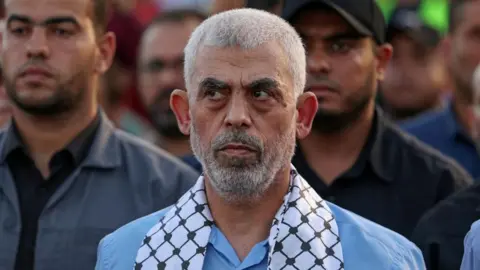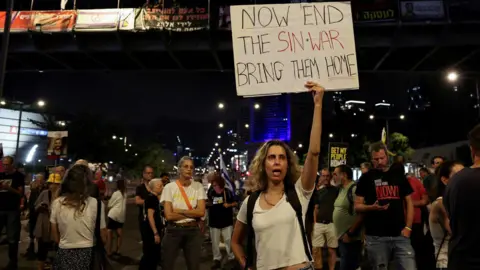Sinwar death is serious blow to Hamas, but not end of war

 Getty
GettyKilling Yahya Sinwar is Israel’s biggest victory so far in the war against Hamas in Gaza.
His death is a serious blow for Hamas, the organisation he turned into a fighting force that inflicted the biggest defeat on the state of Israel in its history.
He was not killed in a planned special forces operation, but in a chance encounter with Israeli forces in Rafah in southern Gaza.
A photo taken at the scene shows Sinwar, dressed in combat gear, lying dead in the rubble of a building that was hit by a tank shell.
Benjamin Netanyahu, Israel’s prime minister, praised the soldiers and made clear that however big a victory, it was not the end of the war.
“Today we made clear once again what happens to those who harm us. Today we once again showed the world the victory of good over evil.
“But the war, my dear ones, is not over yet. It is difficult, and it is costing us dearly.”
“Great challenges still lie ahead of us. We need endurance, unity, courage, and steadfastness. Together we will fight, and with God’s help – together we will win.”
Netanyahu and the overwhelming proportion of Israelis who support the war in Gaza needed a victory.
 Reuters
ReutersThe prime minister has repeated his war aims many times – destroying Hamas as a military and political force and bringing the hostages home.
Neither has been achieved, despite a year of war that has killed at least 42,000 Palestinians and left much of Gaza in ruins.
But the remaining hostages are not free and Hamas is fighting and sometimes killing Israeli troops.
Killing Sinwar was the victory Israel wanted. But until Netanyahu can claim that the other war aims have been accomplished, the war, as he says, will go on.
Yahya Sinwar was born in 1962 in a refugee camp in Khan Younis in the Gaza Strip. He was five years old when it was captured by Israel from Egypt in the 1967 Middle East war.
His family were among more than 700,000 Palestinians who fled or were expelled from their homes by Israeli forces in the 1948 war in which Israel won its independence.
His family came from the town now known as Ashkelon, which is close to the northern border of the Gaza Strip.
In his 20s, he was convicted by Israel of killing four Palestinian informers. During 22 years in jail he learnt Hebrew, studied his enemy and believed that he worked out how to fight them. His time in jail also meant Israel had his dental records and a sample of his DNA, which meant that they could identify his body.
Sinwar was released as one of more than 1,000 Palestinian prisoners who were swapped in 2011 for a single Israel soldier, Gilad Shalit.
On 7 October last year, in a meticulously planned series of attacks, Sinwar and his men inflicted Israel’s worst-ever defeat – and a collective trauma that is still deeply felt.
The killing of around 1,200 Israelis, the hostage-taking and the celebrations of their enemies recalled for many Israelis the Nazi holocaust.
Sinwar’s own experience in a prisoner swap must have convinced him of the value and power of taking hostages.
In Tel Aviv families of the remaining 101 hostages in Gaza – Israel says half of them might already be dead – gathered in the square in which they have been gathering for a year, urging the Israeli government to launch a new negotiation to get their people home.
Einav Zangauker, mother of hostage Matan Zangauker appealed to the prime minister.
“Netanyahu, don’t bury the hostages. Go out now to the mediators and to the public and lay out a new Israeli initiative.”
“For my Matan and the rest of the hostages in the tunnels, time has run out. You have the victory pictures. Now bring a deal!”
“If Netanyahu doesn’t use this moment and doesn’t get up now to lay out a new Israeli initiative – even at the expense of ending the war – it means he has decided to abandon the hostages in an effort to prolong the war and fortify his rulership.
“We will not give up until everyone returns.”
 Getty Images
Getty ImagesMany Israelis believe that Netanyahu wants to prolong the war in Gaza to put off the day of reckoning for his share of the security failures that allowed Sinwar and his men to break into Israel, and to postpone perhaps indefinitely the resumption of his trial on serious corruption charges.
He denies those accusations, insisting that only what he calls ‘total victory’ in Gaza over Hamas will restore Israeli security.
Like other news organisations, Israel does not let the BBC cross into Gaza except on rare, supervised trips with the army.
In the ruins of Khan Yunis, the birthplace of Sinwar, Palestinians interviewed for the BBC by local trusted freelancers were defiant. They said the war would go on.
“This war is not dependent on Sinwar, Haniyeh, or Mishal, nor on any leader or official,” said Dr Ramadan Faris.
“It’s a war of extermination against the Palestinian people, as we all know and understand. The issue is much bigger than Sinwar or anyone else.”
Adnan Ashour said some people were saddened, and others were indifferent about Sinwar.
“They’re not just after us. They want the entire Middle East. They’re fighting in Lebanon, Syria, and Yemen… This is a war between us and the Jews since 1919, over 100 years.”
He was asked whether the death of Sinwar would affect Hamas.
“I hope not, God willing. Let me explain: Hamas is not just Sinwar… It’s the cause of a people.”
The war goes on in Gaza. Twenty five Palestinians were killed in a raid on northern Gaza. Israel said it hit a Hamas command centre. Doctors at the local hospital said the scores of wounded that they treated were civilians.
Parachute drops of aid resumed after the Americans said Israel had to allow in more food and relief supplies.
Every leader of Hamas since the 1990s has been killed by Israel, but there’s always been a successor. As Israel celebrates killing Sinwar, Hamas still has its hostages and is still fighting.
#Sinwar #death #blow #Hamas #war
News plays a pivotal role in our lives by keeping us informed and connected to the world. It serves as a critical source of information, offering updates on current events, politics, economics, science, and more. Through news, we gain awareness of global issues and local developments, helping us make informed decisions in our personal and professional lives. News also fosters discussion and debate, encouraging critical thinking and perspective-taking. Moreover, it promotes transparency and accountability among governments, businesses, and other institutions. In a rapidly changing world, staying updated with the news enables us to adapt to new challenges and opportunities, shaping our understanding of the complexities of society. Ultimately, news is not just about information; it empowers us to participate actively in the world around us, contributing to a more informed, engaged, and responsible global citizenry.
Health is fundamental to our well-being and quality of life, making it an essential aspect of daily existence. It encompasses physical, mental, and emotional aspects, influencing our ability to function effectively and enjoy life fully. Prioritizing health allows individuals to maintain optimal physical fitness, reducing the risk of diseases and promoting longevity. Mental health, equally crucial, affects our cognitive abilities, emotional stability, and overall happiness. Investing in preventive healthcare through exercise, balanced nutrition, and regular medical check-ups helps in early detection of potential health issues, ensuring timely intervention and treatment. Beyond individual benefits, a population’s health impacts societal productivity and economic stability. Governments and organizations worldwide emphasize public health initiatives to address pandemics, health disparities, and promote overall well-being. Ultimately, health serves as the foundation upon which we build our lives, influencing our ability to pursue goals, nurture relationships, and contribute meaningfully to society.
Money plays a crucial role in our lives as a means of financial security and freedom. It enables us to meet basic needs such as food, shelter, and healthcare, while also providing opportunities for education, travel, and personal growth. Beyond material comforts, money facilitates social connections and experiences that enrich our lives. It empowers individuals to invest in their futures, whether through savings, investments, or entrepreneurial ventures, thereby fostering economic stability and growth. However, the pursuit of wealth should also be balanced with ethical considerations, as money can influence relationships and societal dynamics. Responsible management of finances is key to achieving long-term goals and mitigating financial stress. Ultimately, while money is a tool for achieving aspirations and fulfilling desires, its true value lies in how it is utilized to improve both personal well-being and the broader community.
Earning Easy Money in 2024: Opportunities and Considerations 💸
In 2024, the landscape of earning easy money presents diverse opportunities, albeit with considerations. The digital age offers platforms for freelancing, online trading, and e-commerce, allowing individuals to leverage skills and creativity for financial gain. Cryptocurrency investments continue to allure with potential for quick profits, yet they entail high volatility and risk. Moreover, the rise of the gig economy enables flexible work arrangements through apps and websites, offering quick payouts but often without job security or benefits. Passive income streams such as rental properties and investments in stocks or bonds remain viable, but demand initial capital and ongoing management. Amid these options, caution is essential to avoid scams and unsustainable ventures promising overnight success. Ultimately, while the allure of easy money persists, informed decisions, diligence, and a long-term perspective are crucial for sustainable financial growth and security in the dynamic year ahead.






